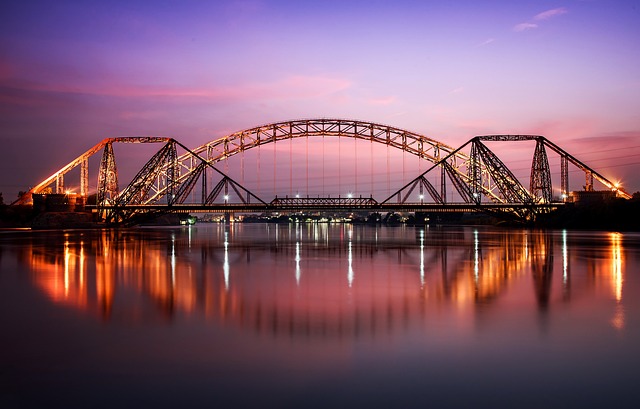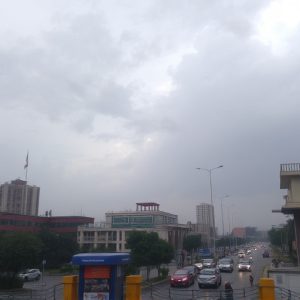Karachi’s Pillars of Faith: A Journey Through Its Iconic Mosques
Karachi's architectural diversity is highlighted by its array of mosques that blend historical…….

Karachi's architectural diversity is highlighted by its array of mosques that blend historical significance with modern aesthetics. Notably, the Badshahi Mosque and Jamia Masjid are landmarks that define the city's cultural identity and skyline. The Hassan Square Mosque exemplifies the fusion of traditional Islamic art with contemporary design, showcasing Pakistan's architectural legacy. Its grandeur and peaceful courtyard offer a spiritual retreat amidst the urban hustle. The Makki Masjid, an ancient structure from the 18th century under the Kalhora dynasty, stands as a testament to Karachi's early Islamic era and its influence on regional architecture. Jamia Masjid Karachi is more than a place of worship; it's a hub for education, social services, and interfaith dialogue, serving as a spiritual oasis and center for community cohesion in the heart of Pakistan's largest city. These mosques are integral to Karachi's cultural fabric, offering insights into its past and shaping its future.
Discover the spiritual heartbeat of Karachi through its most prominent mosques, each a testament to architectural splendor and historical importance. This article invites you on a journey to explore the diverse mosques that dot the city’s landscape, from the grandeur of Hassan Square Mosque to the revered Makki Masjid and the serene ambiance of Jamia Masjid Karachi. Join us as we delve into the unique character and significance of these sacred spaces, which not only serve as centers of worship but also embody the rich cultural tapestry of this vibrant metropolis. Each mosque offers a distinct spiritual experience and architectural insight, making them indispensable to the city’s religious and cultural identity.
- Exploring Karachi's Landmark Mosques
- The Architectural Marvel of Hassan Square Mosque
- The Historical Significance of Makki Masjid
- A Guide to the Spiritual Ambiance of Jamia Masjid Karachi
Exploring Karachi's Landmark Mosques

Karachi, a city rich in cultural and historical diversity, is home to numerous architectural marvels, among which its mosques stand as testaments to both religious faith and architectural innovation. These sacred spaces are not merely places of worship but also serve as landmarks that reflect the spirit and identity of their community. The city’s skyline is punctuated by minarets reaching towards the heavens, inviting residents and visitors alike to explore the beauty within.
One of the most prominent mosques in Karachi is the Badshahi Mosque, renowned for its grandeur and capacity to accommodate over 10,000 worshippers. Its intricate tile work and imposing courtyards are indicative of Mughal architecture’s influence. Another significant landmark is the Jamia Masjid, one of the oldest mosques in the city, which offers a glimpse into Karachi’s historical mosque architecture with its elegant domes and minarets. These places of worship serve as hubs for spiritual reflection, communal gatherings, and cultural preservation, making them integral to the city’s fabric. Each mosque tells a story, from the majestic Hassan Square Mosque to the serene and modern Muhammad Bin Qasim Park Mosque. They are spaces that blend historical techniques with contemporary designs, creating a diverse array of architectural styles that contribute to Karachi’s rich tapestry of religious structures. Visitors to these mosques often leave with a deeper understanding and appreciation for the role these landmarks play in the daily lives of Karachi’s inhabitants.
The Architectural Marvel of Hassan Square Mosque

The Hassan Square Mosque in Karachi stands as a testament to the rich architectural heritage of Pakistan, blending traditional Islamic designs with modern sensibilities. Its grandeur is immediately apparent upon approach; the mosque’s vast courtyard offers a tranquil sanctuary amidst the urban bustle. The intricate marble work and geometric patterns adorning its facade reflect centuries-old craftsmanship, while the use of contemporary materials ensures its place in modern architectural discourse. The central dome, which dominates the skyline, is a harmonious blend of historical motifs and structural innovation, symbolizing the mosque’s role as a bridge between Karachi’s storied past and its dynamic future. Inside, the prayers hall is awe-inspiring, with its towering minarets and vast open space designed to accommodate the spiritual needs of the city’s diverse population. The Hassan Square Mosque is not just an architectural marvel; it is a cultural beacon that serves as a gathering place for reflection, worship, and community cohesion in one of Pakistan’s most vibrant cities.
The Historical Significance of Makki Masjid

Makki Masjid, situated in the heart of Karachi’s Old City area, stands as a beacon of historical significance and architectural splendor. This mosque is esteemed for its role in the city’s early Islamic history; it was one of the first mosques built during the reign of the Kalhora dynasty in the 18th century. The masjid, with its imposing minarets and intricate stonework, reflects the religious and cultural ethos of the period when Karachi was part of the princely state of Sindh. Its construction marked a pivotal moment in the city’s architectural landscape, setting a precedent for mosque design that would influence subsequent Islamic structures in the region. The masjid has stood the test of time, bearing witness to the ebb and flow of the city’s fortunes. It continues to be a place of worship and reflection, drawing visitors from near and far who come to appreciate its historical importance and to partake in the spiritual ambiance it offers. The Makki Masjid’s enduring presence serves as a testament to the city’s rich tapestry of history and its contribution to the global Islamic heritage.
A Guide to the Spiritual Ambiance of Jamia Masjid Karachi

Situated in the heart of the bustling metropolis, Jamia Masjid Karachi stands as a beacon of spirituality and tranquility amidst the city’s dynamic rhythm. The masjid, one of the largest mosques in Pakistan, offers a serene atmosphere that invites worshippers for daily prayers, contemplation, and communal gatherings. Its vast courtyards and towering minarets are not just architectural marvels but also spaces where the spiritual ambiance permeates the air, providing solace to the devout and curious alike. The intricate Islamic designs, coupled with the harmonious recitation of the Quran, create an environment that is both peaceful and spiritually enriching.
Visitors to Jamia Masjid Karachi are often struck by the profound sense of calm that emanates from its expansive grounds. The imposing structure serves as a hub for religious instruction, social services, and interfaith dialogue, reflecting the masjid’s role as a central pillar in the spiritual and cultural life of Karachi. The mosque’s commitment to inclusivity is evident in the diverse congregation it draws, from local residents to those who travel from afar, all seeking a moment of reflection and connection with their faith. The masjid’s spiritual ambiance is a testament to the enduring role of religious spaces in fostering community and offering a sanctuary for contemplation and prayer in the bustling cityscape.
Karachi, a city rich in cultural and historical diversity, boasts a multitude of mosques that serve as architectural marvels and spiritual beacons. Among these, Hassan Square Mosque stands out for its modern grandeur, Makki Masjid is steeped in historical significance, and Jamia Masjid Karachi offers a serene atmosphere for contemplation and prayer. Each of these mosques, or “Mosmiyat” as they are affectionately known, contributes to the city’s tapestry of faith and community, making Karachi’s religious landscape a testament to the enduring spirit of its inhabitants. These landmarks not only define the city’s skyline but also play a pivotal role in fostering a sense of unity and peace within the vibrant metropolis.


